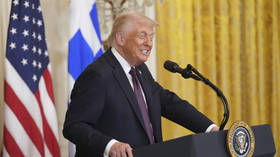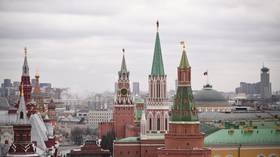Global fears of US power top those of Russia & China – Pew poll
Fears of American power and influence have risen dramatically around the globe in just four years, with more people, even those in some US allied countries, feeling more threatened by American policies than that of Russia or China, a latest Pew poll has found.
The trend has been recorded by the reputed Pew Research Center “amid steep drops in US favorability and confidence in the US president.”
The pollster’s latest survey, released Tuesday, found that on average, 38 percent of people around the globe now regard American power and influence as a major threat to their country. The figure is up 13 percentage points from 2013.
Globally, more people see U.S. power and influence as a major threat https://t.co/gfqj71QCvgpic.twitter.com/3raeKJOWbI
— PewResearch Global (@pewglobal) August 1, 2017
In just four years, perceptions of the US as a threat increased the most in Spain, climbing from 17 percent in 2013 to 59 percent. Turkey, another US ally within NATO, followed, with US anxieties among Turks rocketing from 44 to 72 percent.
Significant increases also occurred in France, Australia and Germany rising 16 percentage points each.
Germany, Europe’s industrial and financial hub, recently engaged the US in a heated debate over trade policies, protectionism, and the latest package of sweeping sanctions against Moscow, which Berlin considers to be damaging to European interests having close cooperation agreements its with Russian partners.
Western fears over US policies were were also echoed by people in some Asian countries, including Japan and South Korea – two major American allies in the Asia-Pacific. According to the 2017 figures, 62 percent of Japanese and 70 percent of South Koreans said the US was a major threat to their nations.
More people see U.S. power and influence as a major threat to their countries in 2017 https://t.co/KO3oWI5XE9pic.twitter.com/w5UNEAqfjG
— PewResearch Global (@pewglobal) August 1, 2017
More people in many countries see U.S. power and influence as a major threat in 2017 https://t.co/FKwwke7Un0pic.twitter.com/WTCTgwvl5Q
— PewResearch Global (@pewglobal) August 2, 2017
Both countries host US troops stationed at a number of military bases, like the ones in Okinawa in Japan and in the South Korean neighborhood of Osan, lying 64km (40 miles) south of Seoul. Okinawans have consistently protested against the US presence on the island, following cases of civilian abuse by American troops. While the recent Pentagon deployment of the THAAD missile defense system has become the subject of widespread controversy and condemnation in South Korea.
Analysing the findings, Pew stated that “the proportion of the public that views American power as a major threat to their country grew in 21 of the 30 nations” that were surveyed in 2013 and 2017.
The US, on the other hand, was globally perceived as being more threatening than traditional rivals Russia and China. Some 35 percent of global respondents placed America on top of the list of the most worrisome world powers, with Russia and China both scoring 31 percent.
Condition of the global economy cited as major threat by a median of 51% across 38 countries https://t.co/VUeTfU6qcSpic.twitter.com/Xk75cpe9Cl
— PewResearch Global (@pewglobal) August 1, 2017
Countries bordering the US – namely, Canada and Mexico – were among those especially concerned about its mighty neighbor. Around 61 percent of Mexicans viewed America as US a major threat, as did 38 percent of Canadians.
Russia was predictably perceived as a threat across the US allies in the West. For instance, 65 percent of Poles, 45 percent of the French and 43 percent of the Dutch voiced unease over Russian power and influence.
Among the less-expected findings in the European section of the survey were Britain and Germany.
With 43 percent of Brits worried about Russia, 35 percent felt threatened by their major transatlantic ally. In Germany, the perceived threat from the US topped that of Russia, 35 to 33 percent.
US sees global popularity plummet under #Trump administration https://t.co/GxKgjiACG7
— RT America (@RT_America) June 27, 2017
America was also listed as the top threat by Middle Easterners (50 percent), Latin Americans (47 percent) and Africans (35 percent). Overall, Islamic State (IS, formerly ISIS/ISIL), climate change and cyberattacks were regarded more dangerous that tensions among the world's biggest powers, having scored 62, 61 and 51 percent respectively.
The Pew survey was conducted in 38 countries and involved 41,953 respondents between February 16 and May 8, 2017, according to the polling center.
“In general, there has been little change in the global threat assessment since the last time these questions were asked,” it observed. “But worries about the US and its power and influence have increased in many countries in Europe and around the world since the election of Donald Trump.”













